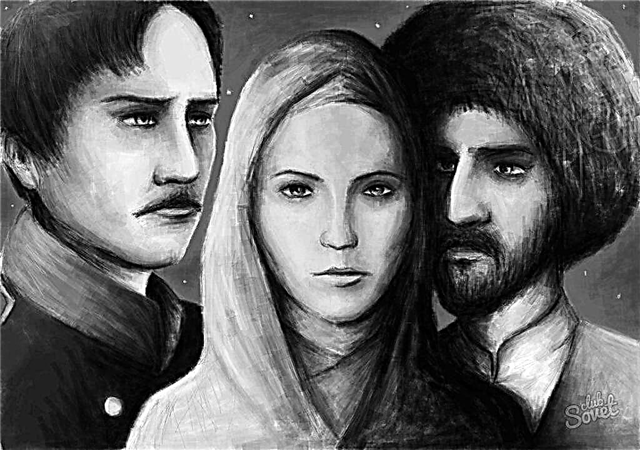The action of this work, saturated in accordance with the literary fashion of the era with pseudo-oriental flavor, takes place in Africa, in the capital of the Congo empire - Banz, in which Paris with its mores, quirks, and also quite real inhabitants is easily guessed.
From 1500000003200001, the Sultan Mangogul ruled in the Congo from the Creation of the World. When he was born, his father - the glorious Ergebzed - did not convene the fairies' son, for most of the sovereigns, whose upbringing was entrusted to these female minds, turned out to be fools. Ergebzed only ordered the main haruspex of Kodendo to draw a horoscope for the baby. But Kodendo, who had come forward solely due to the merits of his cousin-grandfather - an excellent cook, could not read from the stars and could not predict the fate of the child. The prince’s childhood was the most ordinary: before he even learned to speak, he uttered many wonderful things and at four years of age gave material for the whole “Mangoguliade”, and by the age of twenty he knew how to drink, eat and sleep no worse than any sovereign of his age.
Driven by a meaningless whim characteristic of the greats of this world, old Ergebzed passed the crown to his son - and he became a brilliant monarch. He won many battles, enlarged the empire, tidied up finances, amended laws, even established academies, and did all this - to the amazement of scientists - without knowing a word in Latin. And Mangogul was soft, amiable, cheerful, handsome and smart. Many women sought his favor, but for several years the beautiful young Mirzosa had been in the possession of the heart of the sultan. Gentle lovers never concealed anything from each other and were completely happy. But sometimes they were bored. And once Mirzosa, sitting at knitting, said: - You are satiated, sovereign. But the genius of Kukuf, your relative and friend, will help you have fun.
And the genius of Kukuf, an old hypochondriac, took refuge in solitude to powerfully engage in the improvement of the Great Pagoda. Sewn into a bag and wrapped in rope, he sleeps on a mat - but it may seem as if he is contemplating ...
At the call of the Sultan Kukuf flies in, holding the legs of two large owls, and hands Mangogul a silver ring. If you turn his stone in front of any woman, then the most intimate part of her body, her treasure, will tell about all the adventures of her mistress. Put on the little finger, the ring makes its owner invisible and carries it anywhere.
Mangogul is delighted and wants to experience Mirzosa, but does not dare: firstly, he trusts her completely, and secondly, he is afraid, having learned the bitter truth, to lose his beloved and die from grief. Mirzosa also begs not to put her to the test: the beauty is deeply offended by the distrust of the Sultan, which threatens to kill their love.
Vowing Mirzose to never test the rings on her, Mangogul goes to the chambers of the senior sultana of Manimonbanda and directs the ring to one of the ladies present there - the charming prankster Alsina, who is chatting sweetly with her emir husband, although they have been married for a week and can now don't even meet. Before the wedding, the lover managed to convince the emir in love that all the rumors circulating about her were just a heinous lie, but now Alsina’s treasure speaks aloud how proud she is that her mistress has become an important person, and tells what tricks she had to go to convince ardent emir in his innocence. Here Alsina wisely faints, and the courtiers explain what happened as a hysterical fit, emanating, so to speak, from the lower region.
This incident made a lot of noise. The speech of Alsina’s treasure was published, corrected, supplemented and commented on. The Beauty “became famous” throughout the country, which, however, she received with absolute composure. But Mirzosa is sad: the sultan is going to make confusion in all the houses, open the eyes of husbands, despair lovers, destroy women, dishonor the girls ... Yes, Mangogul is determined to continue to amuse himself!
Over the phenomenon of talking treasures, the best minds of the Banza Academy of Sciences are beating. This phenomenon confuses the adherents of both scientific schools of the Congo - both vortexes led by the great Olibri, and the aspirants led by the great Chirchino. The whirlwind of Persiflo, who published treatises on an infinite number of objects unknown to him, connects the chatter of treasures with sea tides, and the scientist Orcot believes that the treasures have always said, but quietly, now that the liberty of speech has become such that without shame it talks about the most intimate things, treasures screamed loudly. Soon the dispute of the sages becomes violent: they leave the question, lose the thread, find it and again lose it, become hardened, reach screams, and then to mutual insults - at which the Academy meeting ends.
Priests declare the chatter of treasures the subject of their competence. The brahmin hypocrites, gluttons and libertines attribute this miracle to the evil spirit of Cadabra; in this way they try to hide their own sins - and for this, any brahmin hypocrite will sacrifice all the pagodas and altars. The righteous Brahmin in a large mosque proclaims that the chatter of treasures is the punishment that Brahma brought down on a society mired in vices. Hearing this, people shed tears, resort to prayers and slightly even to scourges, but do not change anything in their lives.
True, the women of the Congo tremble: here stupid things always break from the tongue - so what can treasure treasure ?! However, the ladies believe that the chatter of treasures will soon become a custom - not to abandon gallant adventures because of it! Here, by the way, one of the many Banzi scammers whom poverty made inventive, a certain Mr. Eolipil, who lectured on erundism for several years, announces that he has come up with gags for treasures. These “muzzles” immediately become fashionable, and women part with them, only making sure that they do more harm than good.
So, Zelida and Sofia, two hypocritical friends who had been hiding their affair with such art for 15 years that everyone considered these ladies models of virtue, now they send in panic for the jeweler Frenicol, after long trading they buy the tiniest “muzzles” from him - and soon the whole city laughs at her friends, who learned this story from Zelida's maid and from the jeweler himself. Sophia decides that, having lost her good name, she must at least preserve her pleasures, and embarks on all difficulties, Zelida, with grief, leaves for the monastery. The poor girl sincerely loved her husband and cheated on him only under the influence of bad morals reigning in the world. After all, they have been telling beauties since childhood that it was like burying oneself alive to be at home and to be with her husband ...
The “muzzle” and the beautiful Zelais did not help. When the sultan sends his ring to her, her treasure begins to wheeze strangely, and she falls without feelings, and the doctor Orcot, removing the “muzzle” from the unfortunate, sees the laced treasure in a state of acute paroxysm. It turns out that a gag can kill - from chatter treasures no one has died yet. Because the ladies refuse to "muzzles" and are now limited only to tantrums. “Without lovers and tantrums, you can’t rotate in the light at all,” one courtier remarks on this.
The Sultan arranges 30 ring tests - and what he just doesn’t hear! At an intimate dinner with Mirzoza, the treasure of one lady tiredly lists all her lovers, and although the courtiers convince the angry husband not to be upset because of such nonsense, he locks his wife in the monastery. Following her, the sultan points a ring at the treasures of the nuns and finds out how many babies these "virgins" gave birth to. The treasure of the passionate gambler Manilla recalls how many times she paid the card debts of her mistress and earned her money for the game, having robbed the old head of the Brahmins and ruined the financier Turkur. In the opera, the sultan directs the ring to the chorus, and their treasures begin to sing frivolous couplets, but soon the performance ends and the treasures of the actresses go to where they have to deal not with singing.
But most of all the sultan is shocked by the story of Felisa - not as beautiful as the charming twenty-five-year-old wife of the fifty-year-old emir Sambuko, a wealthy and famous commander and diplomat. While he worked for the glory of the Congo, the treasure of Felisa swallowed the fame, career and life of the brave colonel Zermunzaid, who, indulging in a campaign of love with Felisa, did not notice the approach of the enemy; then more than three thousand people died, while Felisa shouted “Woe to the vanquished!” threw herself on the bed, where she spent the whole night violently experiencing her misfortune in the arms of an enemy general, and then suffered in captivity from the young and ardent emperor Benin. But her husband bought Felisa, and her treasure quickly swallowed up all the colossal incomes, three ponds and two tall forests of the head of the Brahmins, Sambuko’s friend, and then gobbled up by a beautiful estate, a palace and the horses of one minister, cast a shadow over many titles, acquired innumerable riches ... And the old husband knows everything and is silent.
But the ancient treasure of the elderly Garia, who had already forgotten about the first adventures of her mistress, talks about her second husband, the poor Gascon nobleman Sendor. Poverty defeated his aversion to wrinkles and Garia's four beloved dogs. On the wedding night he was bitten cruelly by dogs and then persuaded the old woman to drive the dogs out of the bedroom for a long time. Finally, Sandor threw his wife’s beloved Italian greyhound out of the window, and Garia hated her husband’s killer for life and pulled her out of poverty.
And in the secluded house of Senator Hippomanes, who, instead of thinking about the fate of the country, indulges in secret debauchery, the treasure of the next lady of this nobleman - pompous Alfana - complains about her difficult life: after all, Alfana's mother squandered the whole fortune of the family, and now her daughter has to earn famous way ...
The treasure of the noble lady Erifila passionately calls for the actor Orgolya. On a date with a beauty, he premiumly picks his nose - a very theatrical gesture that delights connoisseurs - and admires himself and his talents exclusively.
The treasure of a lanky, fair-haired, cheeky and slutty Fanny scolds the illustrious ancestors of her mistress (“Stupid position of a titled treasure!”) And recalls how Fanny suffered for a whole day and a half because no one loves her. “But a lover requires a beloved response from the beloved - and loyalty to the bargain!” - the young philosopher Amizadar told her then and spoke with sadness about his dead lover. Opening their hearts to each other, they knew the greatest happiness unknown to the less loving and less sincere mortals. But this is not for secular ladies. And although Fanny’s treasure is delighted with Amizadar, she herself decides that he and his strange ideals are simply dangerous ...
During the masquerade ball, the sultan listens to the treasures of the townspeople: some want pleasure, others want money. And after the ball, the two officers almost killed each other: Amina, Alibeg’s mistress, gave hope to Nasses! But Amina’s treasure is recognized, which did not give hope to Nasses at all, but to his stately footman. How stupid men are! They think that little things like ranks and titles can deceive a woman’s treasure! The officers recoil in horror from Amina, and the sultan listens to the treasure of Cyprus - a dried-up person who wants to be considered a blonde. In her youth she danced in the Moroccan theater; the landlord - Megemet Tripadhood brought her to Paris and left her, but the courtiers were seduced by the Moroccan, and she earned a lot of money. However, great talents need a big stage. Cyprus worked in sweat in London, Vienna, Rome, Spain and India, traveled to Constantinople - but she did not like the country where treasures are kept under lock and key, although Muslims are notable for the ease of the French, the ardor of the British, the strength of the Germans, the stamina of the Spaniards and the raid Italian sophistication. Then Cyprus successfully worked in the Congo, and becoming useless for nothing, she picked up a noble and rich good-natured husband. The treasure traveler talks about his adventures in English, Italian, Spanish and Latin, but the author does not recommend translating these obscenities to the ladies.
However, sometimes the Sultan uses the magic ring for good. The ring helps to solve the problem of pensions, which are crowded with crowds of widows who lost husbands during the victorious wars of the Sultan. The treasures of these women report that the fathers of their children are not heroes at all, who were not killed by the enemies, but the lovers of the wives, while the widows' pensions will be spent on the maintenance of cute footmen and actors ... The ring saves the handsome noble man from death by castration Kersael: his mistress, the young beautiful Fatima, hearing that he was going to leave her for the sake of a dancer, declares out of revenge that he had raped her, Fatima. Having learned the truth, the Sultan solemnly puts the villain and her treasure under lock and key - but he rescues from the far estate the lovely Egle, who was locked there by the jealous husband, the great Kravchik Celebi, who had heard the false accusations of her enemies; and she herself, following the advice of good friends, acted as if she were guilty, for which she spent six months in the provinces - and this is more terrible for a court lady than death.
He tests the sultan and the treasures of the ladies, with whom the court dandies boast, with ties, and finds out that among the many lovers of these women there was not one of those who loudly dishonored their names.
After the ring tests, the sultan begins to doubt strongly the power of the pagodas, the honesty of men and the virtues of women. The treasures of the latter argue like the treasures of the mares! And the sultan directs the ring to his blue-eyed horse of golden suit, in anger expelling the secretary Zigzag, who dared to think that he is the servant of the sultan, and not his horse, - and forgot that when entering the houses of the great people of this world, you must leave your beliefs behind the threshold . The neigh of a filly, respectfully recorded by another secretary, pundits declare: a) a touching monologue from an ancient Greek tragedy; b) an important fragment of Egyptian theology; c) the beginning of the grave speech at the grave of Hannibal; d) Chinese prayer. And only Gulliver, who returned from the country of horses, easily translates a story full of spelling mistakes about the love of the old pasha and the little filly, which before that had been covered by a great many donkeys.
And Mirzosa philosophizes. She declares her feet as the abode of the soul of the infant. With age, the soul rises higher and higher, and for many women it remains a treasure for life. It determines the behavior of such persons. But with a truly virtuous lady, the soul is in the head and in the heart; and only one dearly beloved person is attracted by such a lady and the call of the heart, and the voice of the treasure. The Sultan refuses to believe that women have a soul at all. With a laugh, he reads to Mirzose the notes of travelers exhausted by the difficult trips, whom he sent to a distant island to acquire wisdom. On this island, priests, choosing married couples, carefully monitor that the treasures of the bride and groom match perfectly in shape, size and temperature, and the most temperamental person has the honorable duty to serve the whole society. “After all, everything is conditional,” says the high priest of the island. “You call crime what we consider virtue ...”
Mirzosa is shocked. The Sultan, however, remarks that if the beloved were stupid and would always enthusiastically listen to him, then this would bring them very close! Everyone has their own business with the islanders. But in the Congo, each is not his own. Although there and here are very funny fashion.Indeed, in the field of fashion, madmen make laws for smart people, and courtesans for honest women ...
However, if the sultan manages to find these most honest women, he is ready to give Mirzose a country palace and a lovely porcelain monkey. Indeed, even dear Egle, resentful of her husband, lost to Almanzor ... But Frikamona, who spent her youth in the monastery, doesn’t even let men on the threshold, lives surrounded by modest girls and adores her friend Akaris. And the other lady, Kallipiga, complains that her lover Mirolo does not pay attention to her treasure, preferring completely different pleasures. The sultan admires the virtue of these ladies, but Mirzosa for some reason does not share his enthusiasm.
At leisure, Mangogul, Mirzosa, the elderly courtier Selim and the writer Rikarik - erudite, but nevertheless clever - argue about literature. Rikarik extols the ancient authors, Selim defends modern writers who describe true human feelings. “What do I care about the rules of poetics? If only I liked the book! ” He says. “Only truth can be liked and touched,” Mirzosa agrees. “But do those pompous performances that are staged in theaters seem like real life ?!”
And at night Mirzose dreams of beautiful statues of great writers and thinkers of different eras. Gloomy dogmas fumigate the statues with incense, which harms the statues a little, and the pygmies spit on them, which does not harm the statues at all. Other pygmies cut off noses and ears from living heads - they correct the classics ...
Tired of philosophizing, the Sultan also has a dream. Mangogul on a hippogriff rises into a huge building soaring in the muddy space, full of old half-naked cripples and freaks with important faces. Balancing on the tip of the needle, an almost naked old man blows soap bubbles. “This is a land of hypotheses,” Plato explains to the Sultan. “And the scraps of fabric on the bodies of the philosophers are the remains of Socrates's robes ...” Then the Sultan sees a weak child who, in his eyes, turns into a mighty giant with a torch in his hand, illuminating the whole world with light. It is an Experience that destroys a shaky hypothesis building with one blow.
Sultan magician. A blockchain nicknamed the Empty Dream talks about night visions. It’s all about our perception ... Indeed, in reality, we take some people for smart people, others for brave men, old fools consider themselves beauties, and scientists publish their night ravings in the form of scientific works ...
While the sultan is looking for virtuous ladies, the sixty-year-old Selim - a beautiful, noble, graceful, wise, who was a favorite of all women in his youth, who in his old age became famous in the state field and gained universal respect - admits that he could not comprehend women and can only idolize them. As a boy, he lost his innocence with his young cousin Emilia; she died in childbirth, and Selim was scolded and sent to travel. In Tunisia, he climbed a rope ladder to the pirate’s wife, on the way to Europe caressed a lovely Portuguese during a storm, while her jealous husband stood on the captain’s bridge; in Madrid, Selim loved the beautiful Spanish woman, but he loved life even more, and therefore fled from the beauty’s husband. Selim knew frivolous French women, cold-looking, but ardent and vengeful English women, stiff Germans, skilled in the caresses of Italians. Four years later, Selim returned home quite well-educated; since he was also interested in serious things, having studied military affairs and dances, he received a high post and began to participate in all amusements of Prince Ergebzed. In Banz, Selim recognized women of all ages, nations, and estates - promiscuous secular ladies, hypocritical bourgeois women, and nuns, whom he penetrated as a novice. And everywhere, instead of sincere feelings, he found only deceit and pretense. At thirty, Selim married to procreate; the couple treated each other as it should - coldly and decently. But somehow Selim met a charming Sidaliza - the wife of Colonel Spaga Ostaluk, a glorious man, but a terrible freak and jealous. With great difficulty, having completely changed, Selim managed to win the heart of the virtuous Sidaliz, who believed that there could be no love without respect. Selim hid the adored woman in his house, but the jealous husband tracked down the fugitives and pierced his wife's chest with a dagger. Selim killed the villain and mourned for a long time his beloved, but then he realized that there is no eternal grief and for five years now has been connected by tender feelings with charming Fulvia. The Sultan hurries to test her treasure - and it turns out that this titled lady in a passionate desire to acquire an heir for ten years has been given to everyone. The offended Selim is considering leaving the courtyard and becoming a philosopher, but the Sultan keeps him in the capital, where Selim continues to enjoy universal love.
He tells Mirzose about the "good old days", the "golden age of the Congo" - the reign of Grandfather Mangogul, Sultan Kanoglu (a hint of Louis XIV). Yes, there was a lot of brilliance - but what poverty and what lawlessness! But the measure of the greatness of the sovereign is the happiness of his subjects. Kanoglu turned his close associates into puppets, and he himself became a puppet, ruled by an old decrepit fairy (a hint at Ms. de Maintenon).
And the sultan, meanwhile, is experiencing the treasure of Zayed - ladies with an impeccable reputation. Both the heart and the treasure of the beauty speak with one voice about love for Zuleyman. True, married Zayed to the disgusting Kermades ... And yet the sultan is shocked by the image of the faithful and beautiful Zayed - and Mangogul himself makes her an immodest offer, having received a decisive refusal, returns to the captivating Mirzosa.
And she, a fan of high principles, completely unsuitable either for her age, or for her position, or for her face, praises pure love based on friendship. Sultan and Selim laugh. Without the call of the flesh there is no love! And Selim tells the story of the beautiful youth Gilas. The great idol deprived him of the ability to satisfy his passion and prophesy that only the woman who would not love him would cure the unfortunate person, further learning about his misfortune. But all women - even ardent fans of platonic love, old women and immaculate vestals - are recoiling from Gilas. Only the beautiful Iphis heals him, on which lies the same spell. Gilas so ardently expresses his gratitude to her that soon he begins to threaten the return of the disease ...
Here comes the news of the death of Sulamek - a nasty dancer, who, thanks to the efforts of his fans, became a teacher of the Sultan's dances, and then with the help of curtsy - and the great vizier, in which position he spent fifteen years. During the brilliant gravestone speech of the preacher Brrrububu Mirzoz, which lies always leads to a hysterical state, falls into lethargy. To check whether the beauty is alive, the sultan sends a ring to her, and Mirzoza’s treasure declares that, faithful to the sultan to the grave, she is unable to part with her beloved and go to the other world. The beloved favorite is offended by the fact that the sultan broke his promise, but he sang in ecstasy in eternal love. Having forgiven the sovereign, the favorite nevertheless begs him to return the ring to Kukufe and not disturb her heart or the whole country. Such is the Sultan and is doing.












